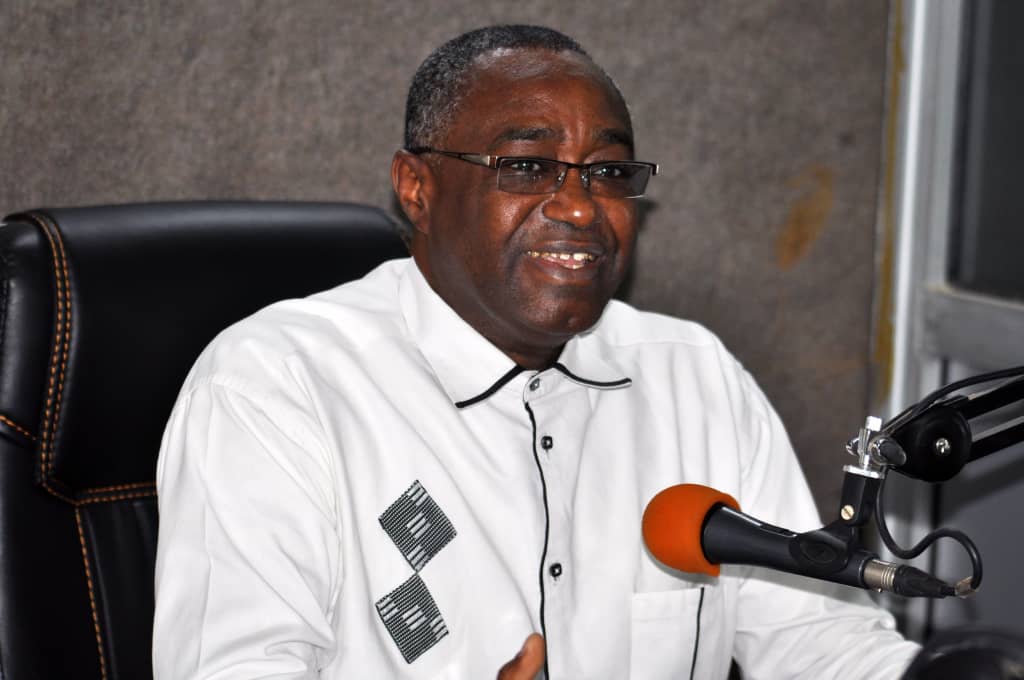In this interview with “L’AS”, Amadou Kanouté, Executive Director of the Pan-African Institute for Citizenship, Consumers and Development (CICODEV) discusses the management of the crisis related to the new coronavirus.
In this interview with “L’AS,” the Executive Director of the Pan-African Institute for Citizenship, Consumers and Development (CICODEV) talks about the management of the new coronavirus crisis. Although Amadou Kanoute admits that the management of the epidemic has been positive overall, he says that the latest adjustments made by the government in relation to the control strategy have created a feeling of complacency or “washing of one’ s hands of it”. “L’AS”: It will soon be three months since COvID-19 appeared in Senegal. How do you assess how the Senegalese authorities managed the health crisis to date? Overall, the management has been positive. I only want to judge by the results to date in the face of an unknown, highly contagious and lethal pandemic and by taking into account the state of our health system. In fact, it is first and foremost a race to ensure a balance between our capacity to provide healthcare, social and economic care and respect for a right enshrined in our Constitution: the human right to health. And then the marathon begins, because no one can predict how long we will have to live with this virus. Therefore, I have a generally positive view of the management of the crisis by looking at some points that can be considered as benchmarks in the management of a crisis like the one we are experiencing. The strong involvement of all the actors (State, civil society, private sector, religious, CBOs, media) has made it possible to implement information and awareness campaigns on the measures and actions that are barriers, with very appreciable results. This is the case for the rapid reaction to the masks’ being produced and appropriated by the people. Treatment protocols such as the choice of hydroxychloroquine – in which it was a question of engaging the responsibility of the healthcare personnel – were quickly used in an uncertain environment. Often bold but necessary emergency measures were taken, such as closing borders, banning public demonstrations, closing places of worship, schools and universities, even though human rights abuses were noted and adjustments were subsequently made, some due to social, religious and economic pressures. All of these things have given a feeling of complacency or “a washing of one’s hands of it” to a large segment of the population. Although the number of deaths is increasing daily, the average recovery rate to date is around 40%. This is a remarkable record compared to many other countries. Faced with the risk of saturation or overflow of our health system, alternative strategies (out-of-hospital care) are being explored. Finally, I am pleased that the country has adopted a multisectoral contingency plan to combat COVID 19. The Ministry of Health and Social Action (MSAS) recently shared it with civil society actors. We are currently studying it. What I retain from this development is that this plan should help to ensure and consolidate the coherence and synergy of the interventions of the different actors. This is extremely important. Your organization had expressed its disagreement with the reduction in the budget allocated to the health sector during the last budget review. With the COVID19 pandemic, it seems that history has proven you right… Absolutely! It is like a slap in the face to force us to revisit our priorities. What disappointed us in this budget cut are the contradictions and the reversals between commitments and actions. Two years ago, the country organized a National Forum to develop a health financing strategy. The various actors (State, private sector, TFPs) each made commitments. The State had committed to increasing the MSAS budget by 2% each year. Now, for the 2019-2020 budget, there is a decrease of 0.4%. Three months later, we are caught up by this pandemic which obliges us to look everywhere for extra-budgetary resources to cope with it. Our second regret is that we tend to forget the centrality of health in any economic and social development policy. We forget too quickly that human capital is one of the pillars of the PES. And human capital is first and foremost healthy citizens capable of creating wealth. At the social level, the stigmatization of supposed victims is growing. Is this not a dangerous attitude that needs to be addressed?
Today, are we aware of the number of people who are infected and who refuse to go to hospitals out of fear of the stigma that would follow if their tests were to be positive? How many villages and households refuse to allow their inhabitants or relatives to be declared positive? Have you analyzed or observed how the press treats reported contamination cases? It headlines “father infected daughter”, “this person infected this village”. All this may seem anecdotal, but essentially we are being told that this disease is shameful and infamous. Today, the only communication that is worthwhile – besides barrier gestures – is to “trivialize” this disease as a disease that can happen to anyone. We need to model the public figures who have dared to use videos to declare their illness, the midwives and other health workers who are on the front line. We need to show and say that this disease is curable if you start early. The press needs to change the way it treats information about the contamination. Health workers who come to test or to look for those who call them to report must be more discreet. Otherwise, so-called community cases will continue to increase because people will be reluctant to be tested and to report themselves, this is due to the fear of stigmatization. Do you think the virus should be left to spread and the government’s restrictions should be lifted? No. That would be the best way to tear down our already under-resourced health care system. Rather, it is a matter of adapting the restrictive measures to our socio-economic and cultural situation. Even though our authorities have reduced and put constraints on mobility, they also very quickly realized that the confinement model as practiced in developed countries could not work in our country: no running water in every house, no electricity to keep food fresh as long as we could get supplies other than through retail purchases; the State itself does not have the means to provide for the needs of the most disadvantaged citizens over an uncontrolled period of time. The whole idea, therefore, is to find a good balance between the health of citizens and the maintenance of a level of economic activity that allows them to generate income to meet their needs. In your opinion, what should be done to reduce the socio-economic damage caused by the COVID 19 pandemic? I’m glad you brought up socio-economic damage. Many of the social gains made in recent years will be wiped out because of the pandemic. In the short term, the priority to reduce this damage is to invest in health and disease management to prevent our health care system from being completely destroyed. The next priority is to fight against food vulnerability. Winter is approaching. We need an amending finance law to redirect a large part of this country’s resources into agriculture, especially in a climate-changing environment. Our resources must be used to prioritize the search for food self-sufficiency – and eventually move towards food sovereignty – wherever possible. The pandemic threatens export sales, the service sector such as tourism or remittances from Senegalese living abroad, which are so crucial for many households and for our economy. There are certainly opportunities for us to build more resilient economies in this crisis. It’s incredible how the creative genius of the informal sector actors, of our research, of our academics has been unleashed with this crisis. Today, this country no longer needs to import masks. The demand is covered. Our scholars have manufactured respirators, hydro-alcoholic gels and robots.
Our researchers want it and say we need to value our medicinal plants. The Delegation of Rapid Entrepreneurship is going to meet them and fund their projects. Our decision-makers and civil society have regained the voice to say loud and clear that the debt is suffocating us and we want it cancelled outright, to allow us to invest in basic social services such as water, sanitation, social protection, etc. All this will help minimize the impact of the pandemic on our households, our jobs and our economy in general. Do you think that the way in which the State supports the underprivileged strata by distributing food is the best solution in such circumstances? CICODEV is represented in Senegal’s 14 regions by our Focal Points who monitor household targeting and distribution. We are in favor of greater transparency, equity and accountability in the management and distribution of food assistance and ensure this in our involvement from the community level to the departmental level. We are also in favor of more discretion in the distribution. Do you think that the Monitoring Committee of the COVID-19 force fund can fulfill the missions assigned to it in view of the congenital defects noted at the time of its creation (composed in majority of members of the regime) and the confusion over the per diems of the 3.5 million announced? The COVID 19 Force funds, I remind you, must be governed by the terms of Article 33 of the Organic Law on the Finance Act. They are assistance funds constituted by voluntary contributions made by legal or private individuals, and in particular by donors, to contribute with the States’ resources to public interest expenditures. They also come from legacies and endowments allocated to the State. They must be recorded as revenue in the budget and an additional credit of the same amount is opened on the program concerned by order of the minister in charge of finance. The use of competition funds must be in accordance with the intention of the contributing party or donor. What we call upon our authorities to do is to comply with these procedures even if the management is urgent. And that is why it is very embarrassing that the structure has been shaken by jolts about sharing per diems. The intention of the parties and donors was first of all to provide assistance to households affected by the pandemic. And not to compensate those to whom the state has given the privilege of serving a noble cause. This is why we advocate that, like the press briefings held by the MSAS, the Ministry of Budget should also hold press briefings to inform us of the status of resource mobilization and their use. The advantage is certain: the confidence that this will create among the parties involved and the interest of other donors.
An interview with Amadou Kanouté, Executive Director of CICODEV by L’AS, on Saturday, May 23, 2020.

